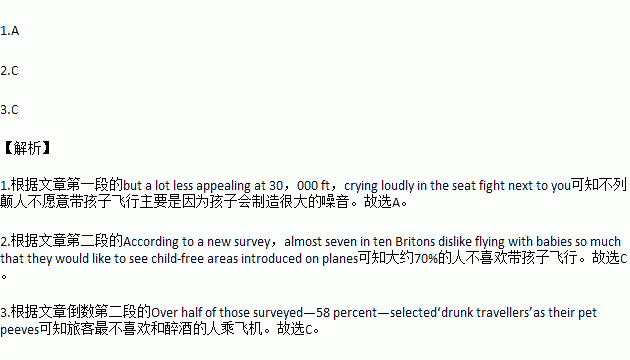题目内容
They are the little sweeties who look pretty cute in a photo,or when sleeping——but a lot less appealing at 30,000 ft,crying loudly in the seat fight next to you.
According to a new survey,almost seven in ten Britons dislike flying with babies so much that they would like to see child-free areas introduced on planes.As for long-distance flights where people want to sleep,almost one in four British travelers believes that no-kid-zones should be fixed as required sections.

The survey was conducted by bookings website LateDeals.co.uk,with 1,108 UK consumers questioned as to what they hate most about air travel.
And our dislike of noisy children and babies on planes runs deep.it seems.
More than a third of us—35 per cent—would pay extra to travel on a childless service.
Long-distance passengers would be prepared to pay an additional £63 to the cost of a return ticket if it meant adults only on board.And on short-distance flights,an extra £28 on the price of a return fare would be considered good value if it guaranteed an absence of angry babies in the middle of the economy-class aisle(走道).
However,screaming babies are not the only source of annoyance for British travellers.In fact,according to the research on the most annoying types of airline passengers,a crying baby ranks as only the fourth.Over half of those surveyed—58 percent—selected ‘drunk travellers’ as their pet peeves.People with‘bad personal hygiene(卫生)’and travellers who kick the back of the seat in front were also near the top of the list,causing anger to 48 and 47 per cent of us respectively(分别地).
Crying babies came in at fourth on the list,a pet peeve for 43 per cent of those surveyed.
1.Britons dislike flying with babies because they_________.
A.make too much noise
B.get angry easily
C.sleep right next to them
D.stay in the economy-class aisle
2.How many British travellers surveyed would like to have no-kid-zones on planes?
A.About 35%. B.About 43%.
C.About 70%. D.About 58%.
3.What kind of passengers is most disliked by British airline travellers?
A.The crying babies on a flight.
B.People with bad personal hygiene.
C.Those who have drunk too much alcohol.
D.Those who kick the back of the seat in front
 天天向上一本好卷系列答案
天天向上一本好卷系列答案 小学生10分钟应用题系列答案
小学生10分钟应用题系列答案请认真阅读下列短文,并根据所读内容在文章后表格中的空格里填入最恰当的词(每空1词)。
Cheating on exams is popular in the various kinds of exams in colleges. Students don't feel shame to cheat on exams. Most of them don't care about cheating on exams. They know that results of cheating on exams aren't serious punishment, which leads to frequent cheatings on exams.
At the University of Nevada, after students photographed test questions with their cellphone cameras, transmitted them to classmates outside the exam room and got the answers back in text messages, the university put in place a new monitoring system.
With their electronic tools, students these days find it easier to cheat. And so, faced with a lot of the latest technology in recent years, college officials find themselves in a new game of cat and mouse, trying to outwit(胜过) would-be cheats this exam season with a range of strategies--cutting off Internet access from laptops, or demanding the surrender(交出) of cellphones before tests.
Mr Dapremont said technology had made cheating easier, but added that plagiarism(抄袭) in writing papers was probably a bigger problem because students can easily lift other people's writings off the Internet.
Still, some students said they thought cheating these days was more a product of the attitude, not the tools at hand. Pressure to succeed sometimes clouds everything and makes people do things that they shouldn't do. Students today feel more pressure to do well in order to graduate from school and secure a job.
Whatever the reasons for cheating, college officials say the battle against it is wearing them out. First, people cheating on exams will lose interest in studying. Second, he thinks studying isn't meaningful. Even though he doesn't do anything, he can get scores. Third, people cheating on exams will influence others. Plenty of people working hard think that their records are lower than people cheating on exams. Thus, we must ban cheating on exams. We should reduce opportunity of cheating on exams.
Most Americans still believe that honesty is an important part of the American character. For that reason, there are numerous watch-dog committees at all levels of society. Although signs of dishonesty in school, business, and government seem much more numerous in recent years than in the past, could it be that we are getting better at revealing such dishonesty?
Many educators feel that as students gain confidence in themselves and their abilities, they are less likely to cheat. Surprisingly, some efforts to prevent cheating may actually encourage cheating--a person may feel "they don't trust me anyway", and be tempted to "beat the system". Distrust can be contagious (传染的). But, so can trust.
Title | Cheating on Exams |
Phenomena | ●Cheating on exams gains high 1. in colleges. ●Students don't feel shame or 2. the frequent cheating on exams seriously. |
Means of cheating | __3.___test questions to classmates outside the exam room by cellphone and then waiting for the answers. |
Reasons | ●Cheating won't cause anyone to be 4. seriously. ●The latest technology makes one cheat more easily. ●Bigger pressure forces students to do well to ensure 5. and a job. |
6. | ●Cheating will 7. people their interest in studying. ●People will think there is no 8. in studying. ●People cheating on exams will influence others negatively. |
Ways | ●Encourage people to be 9. . ●Let students 10. themselves and their abilities. |

